What a difference a week can make in the world of stocks and shares. Stocks and shares investing platform, Robinhood, has brought into question the meaning of the term ‘free market’ following the app’s attempts to restrict the movement of Reddit users from buying shares in GameStop.
The unprecedented action occurred as Reddit group, WallStreetBets, crowdsourced the mass purchase of stocks in GameStop when hedge funds had taken out short positions in the firm – effectively banking on falls in share prices.
The move aided the Reddit users in making huge gains in their GameStop shares, with stocks rising by as much as 131% in a single day. However, the hedge funds and other investors holding shorts against the company are estimated to have lost out on over $19 billion.
In the fallout of this coordinated mass investment, trading app Robinhood limited users’ ability to purchase shares in GameStop in a move that appeared to support the hedge funds.
The ironic defence of hedge funds emanating from an app named ‘Robinhood’ prompted a widespread backlash across the internet. The app was bombarded with so many one-star reviews that Google was forced to act in deleting them as they arrived.
The saga between Reddit users, GameStop stocks, and the hedge funds that were outmanoeuvred by WallStreetBets carry some of the hallmarks of a real-life Robin Hood story, so let’s take a deeper look into 15 trading alternatives that appear to respect the free market rather than seek to restrict it:
1. TD Ameritrade
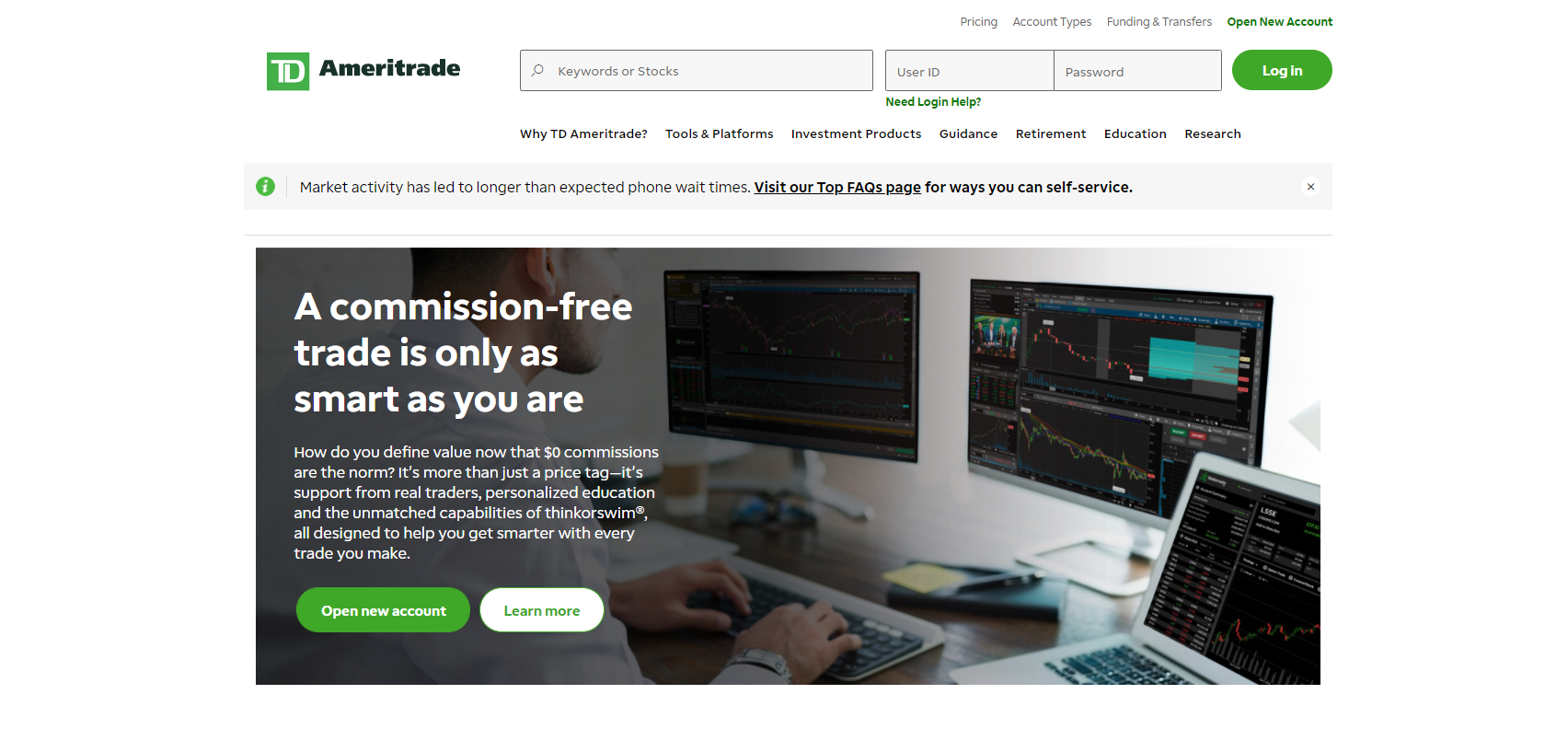
TD Ameritrade is a highly-resourceful platform that requires a $0 minimum investment and offers a leading array of features like extensive research and data, great portfolio-building guidance, $0 commissions for stock, options and exchange-traded fund trades and nearly 300 brick and mortar branches around the US for in-person customer service.
One of TD Ameritrade’s best assets is its full range of investments offered, including futures, forex and Bitcoin futures trading for approved clients.
There’s also a broker’s selection of over 4,000 no-transaction-fee mutual funds which is either equal to or in excess of what’s offered at other reputable brokers like Charles Schwab and Fidelity.
TD Ameritrade is also great at offering low-cost and low-minimum funds, with over 700 mutual funds on its platform with expense ratios of 0.50% or less, and over 1,300 with investment minimums of $100 or less. This means that the platform makes for an excellent broker for beginner fund investors.
2. E*TRADE
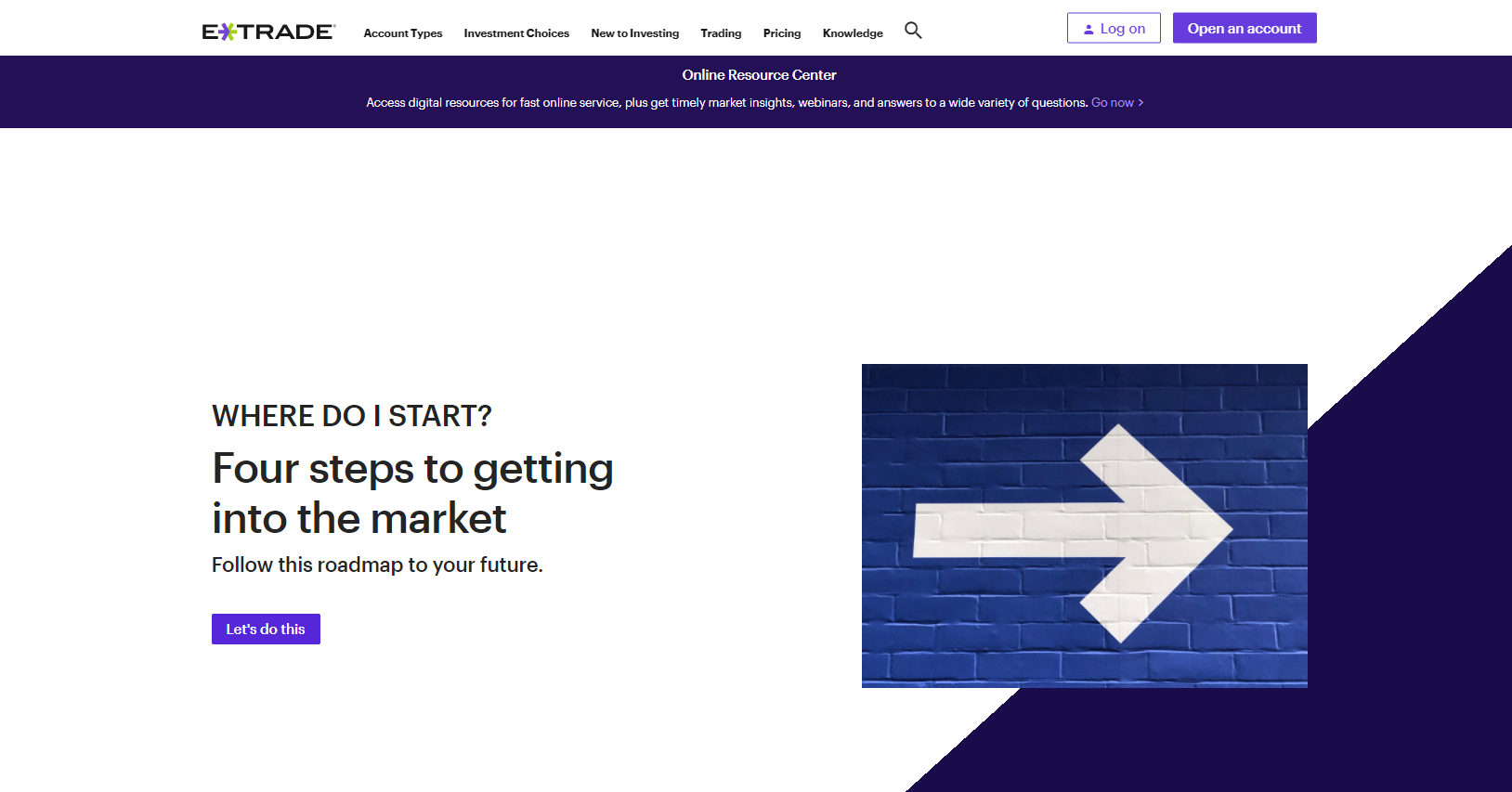
While E*TRADE has been an online brokerage trendsetter that’s been held back by excessive commissions over the past decade, in 2019 the platform joined a majority of brokers in cutting equity and per-leg options commissions to $0.
The brokerage offers three computer-based platforms and two fully functional smartphone apps that can appeal to a range of investing styles and interests. Its web platform at etrade.com has recently undergone a makeover with user experience becoming a driving force for the company.
E*TRADE offers fully integrated options tools within its platform thanks to the company’s recent acquisition of former rival, Options House. For more experienced traders, the brokerage even offers its downloadable platform, E*TRADE Pro, a service that streamlines real-time data alongside industry-leading charting tools.
3. Fidelity

Fidelity has evolved to become a key player in the online brokerage landscape. Fidelity’s services have been a winner at Investopedia’s 2019 and 2020 Best Online Brokers Awards, and the firm appears to be continually looking for ways to lower costs to investors while improving the quality of their services.
In October 2019, Fidelity joined its competitors in cutting its equity and base options commissions to zero, but still continues to deliver high-quality research and education offerings to its clients. The Firm also makes it straightforward for investors to earn interest by converting uninvested cash into a money market fund.
Although Fidelity’s website looks a little old fashioned at first glance, don’t be deceived by its power. This platform is one of the most advanced and innovative brokerages online.
Fidelity is already one of the largest brokers in the US, and is designed to make stocks and shares accessible for the vast majority of individual investors. For the typical buy-and-hold investor, Fidelity is a highly functional and well-balanced platform that offers a suitable volume of tools to navigate the markets.
However, the platform is also scalable, and for more advanced traders, Fidelity offers Active Trader Pro, a downloadable program with real-time data streaming and customizable user interfaces.
4. eToro
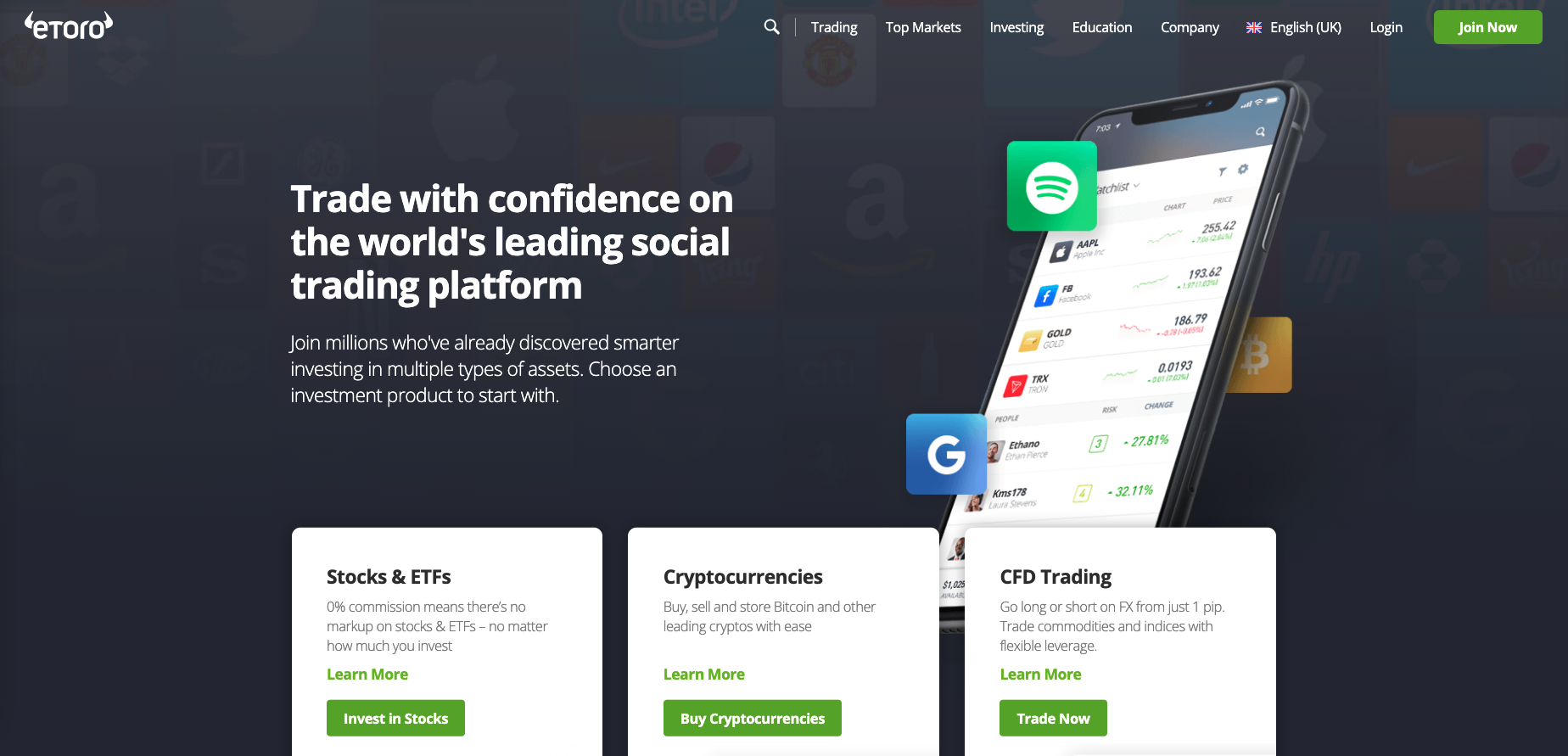
The true draw of eToro is its user-friendly interface filled with clear colour-coordinated charts and graphs to show investors where movements are taking place
One of the biggest features of eToro lies in how individual traders can implement copy trading. The platform features traders who want to be copied and those who follow risk-control rules. This level of accessibility then enables retail account holders to follow the trades and strategies of the most successful clients on the platform – both as they conduct their business and without the need of physically agreeing on any trade. Of course, it’s worth noting that copy-trading doesn’t come with any guarantees towards profits or losses for users.
eToro makes for a great platform that welcomes newcomers into trading – whether it’s for stocks, shares or cryptocurrencies. While its customer service isn’t always the most attentive, there are great features available for residents both inside and outside of the US to enjoy.
5. Acorns

Acorns is an all-in-one financial wellness and investment app that makes it easy for users to save and invest.
While Acorns features a functional app that can rival that of Robinhood, this platform deals heavily in micro-savings. However, the app does much more than simply invest your spare change.
Users can turn to Acorns to invest in their retirement, create a checking account and set up a custodial investment account for their children as well as many more services.
Although Acorns started as an app, it’s also available as a web-based version for desktops and tablet users.
By linking their credit card and checking account, Acorns can automatically round up the purchases that users make to the nearest whole number and pull the difference from their account into a checking account. The service then automatically invests the money and allows the user to access their earnings.
Acorns is certainly a great entry point into the world of investments for anybody who needs a little bit of guidance before getting started in the industry. Although the stocks in which money is allocated is generally done automatically, the app utilizes a team of experts to ensure that the money coming into portfolios are well managed.
6. Public.com

Public has turned the buying, selling and owning of stocks into something that just about anyone can do and understand. Where many of us still see the stock market as a mysterious beast that’s untameable for smaller investors, Public seeks to simplify the process of buying into companies and holding money in stocks.
With Public, users can simply own a piece of a company that they believe in for any amount of money that they wish.
The service offered by Public is enhanced by a very user-friendly companion app and some simplified and easy-to-follow visualisations. In the image above, we can see that the platform also looks to provide simple summaries regarding specific stocks – notifying users on the level of risk associated with specific stocks.
Again, Public is an excellent platform for users who are either new to the world of stocks and shares or who are simply looking to invest small amounts of money into a company that they like.
7. Ally Invest
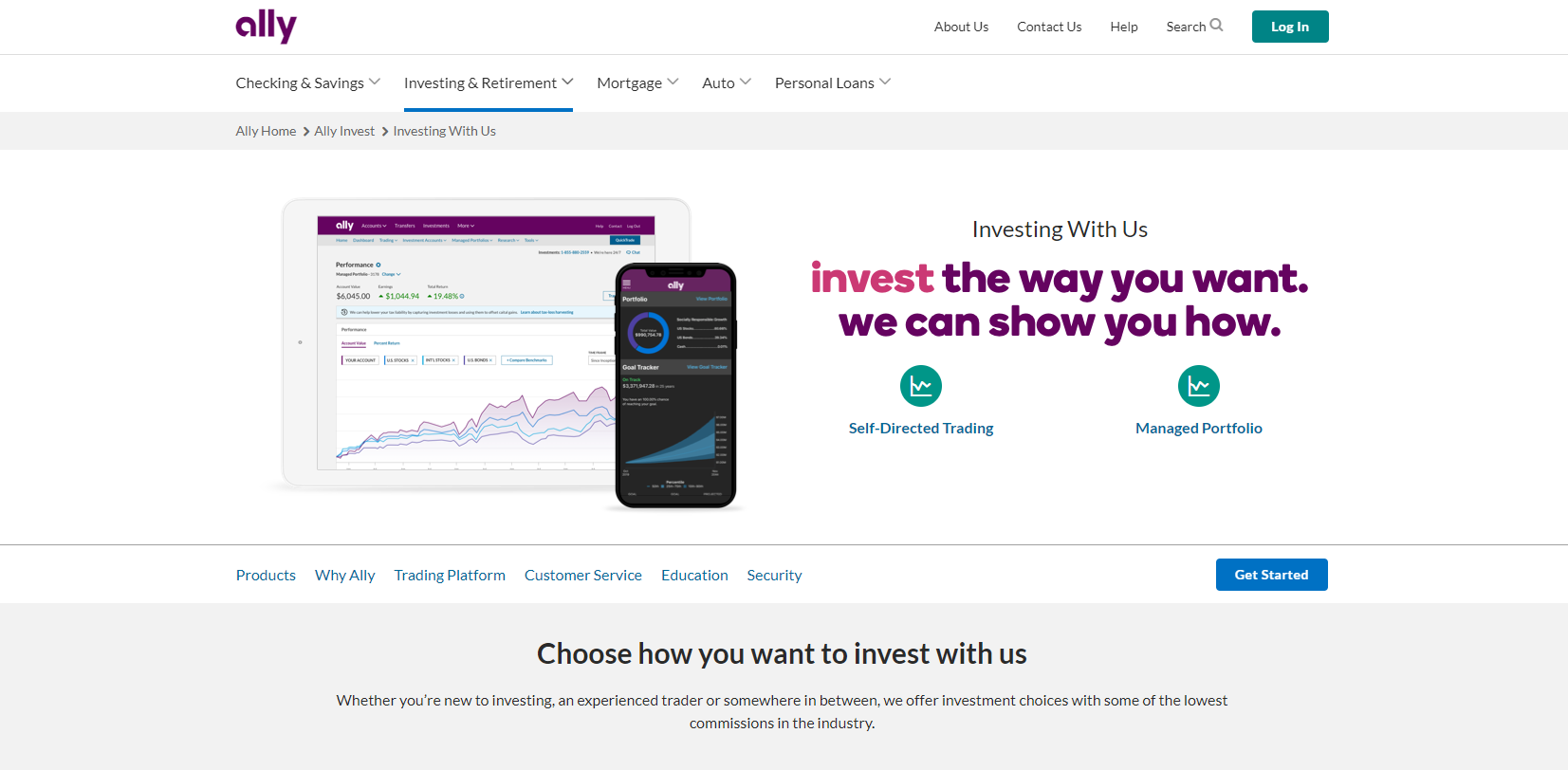
Ally Invest is part of a diversified financial services company that includes banking, lending and an online brokerage that was formally known as TradeKing.
This platform is primarily focused on providing tools that are convenient and easy to use at a more affordable price than its rivals – all geared towards a more millennial user base. However, Ally Invest’s inherited customer base have been finding fewer resources for options analysing and trading while the platform has spent more time on adding services for buy-and-hold investors.
Development efforts for Ally are geared towards removing technological walls between banking and investing features, with more attention paid towards customers who are new to the world of investing. However, this has meant that the platform still has some legacy options for traders dating back some years.
Despite being a platform that’s undergoing something of a transition, Ally Invest is still a great platform for young investors who may not be naturally familiar with the world of stocks and shares. With a highly intuitive app and great usability, Ally is definitely a platform to keep track of.
8. WeBull
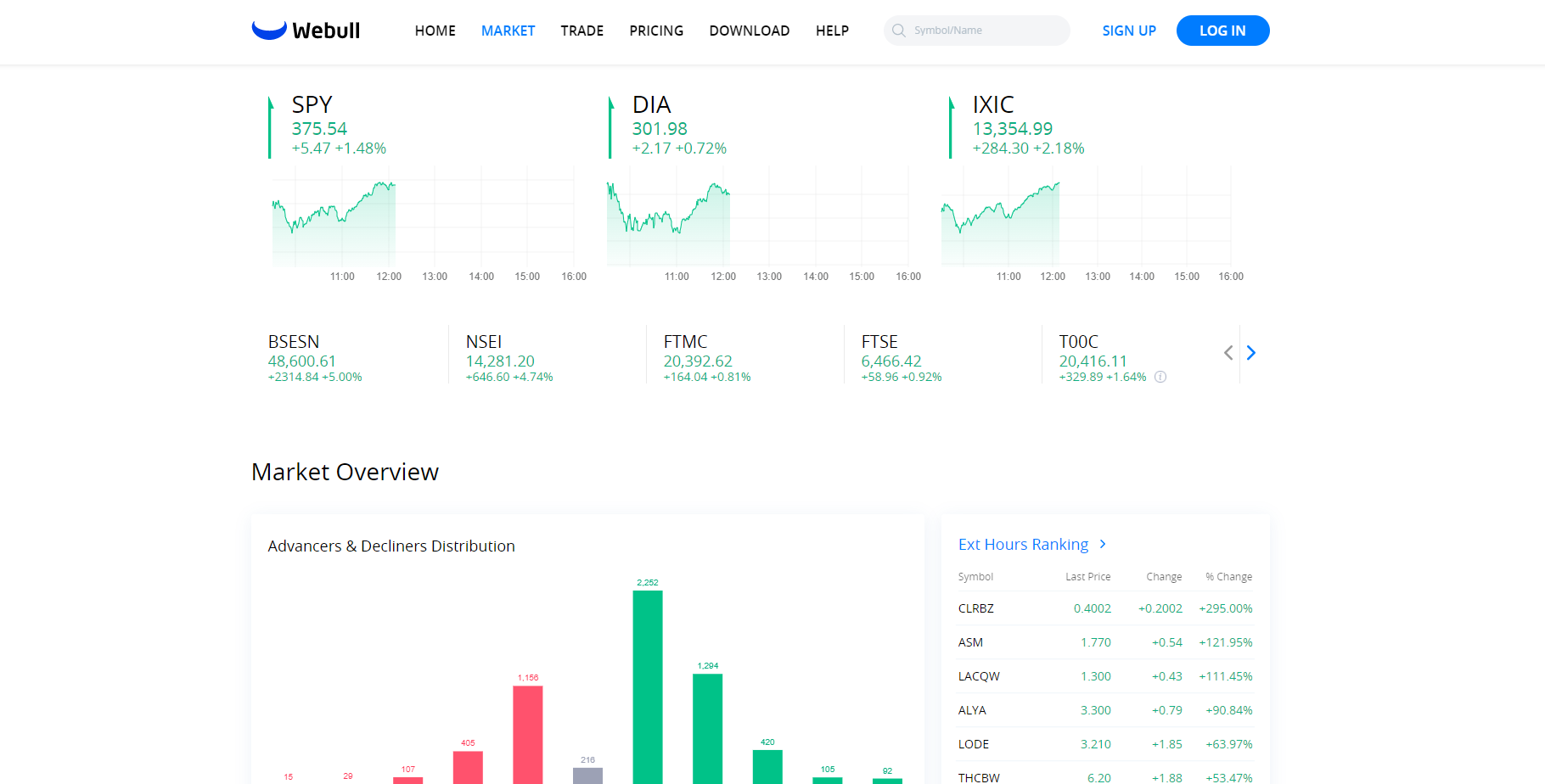
Webull offers a unique community experience and an easy to use trading platform to boot. The platform is certainly designed with younger investors in mind, but for everyday investing, the brokerage may lack the trading tools and features to compete toe-to-toe with its rivals who also offer $0 stock and ETF trades.
Much like Robinhood, Webull attracted a loyal customer base because of its ease of use and its early commitment to offering $0 trades to users.
Because of its similarities to Robinhood, Webull makes for a natural transition to any users who have become accustomed to Robinhood’s vibrant community and features. In fact, Webull outpaces Robinhood in the features department and although it’s not an industry leader, the platform’s visualisations and ease of use make it a brokerage that’s packed with potential.
9. Cash App

As we can perhaps see from Cash App’s extremely busy and engaging website, this is a platform that’s once again angled towards delivering investment services to younger and perhaps more inexperienced investors.
Cash App allows users to pay friends and invest sums of money into stocks or bitcoins in a manner that can be much easier than its competitors. In Cash App’s framework lies a platform that’s capable of competing with Venmo and PayPal as an on-the-go financial hub. However, it’s actually not possible to pay online or real-world merchants directly through the app – only a user’s contacts.
The app doesn’t yet have the user base to effectively challenge its rivals in the industry, which is a problem because to pay someone, they have to be using Cash App too. However, the platform is well-equipped with a great micro-investing platform that allows users to put their spare change into stocks. That, along with cash card discounts and the potential of $Cashtags mean that Cash App could evolve into one of the industry’s most essential platforms in the near future.
10. Betterment

Betterment is a pioneering platform in the world of robo-advisory and is one of the first to use technology to recommend a portfolio and automate the investment process for users.
This platform isn’t a pie-in-the-sky startup with lofty ideas either. Betterment was founded in 2008, and since then the firm has added additional asset classes and cash management products to build a significantly resourceful product for customers.
Betterment’s platform is highly intuitive, user-friendly and filled with educational resources – making it a top choice for starters. Betterment also offers tax-loss harvesting for all accounts, regardless of their size, and a multitude of checking and savings account options for users – making it one of the best options out there if you’re looking for better cash management.
11. Wealthsimple

Launched in Canada in 2014, Wealthsimple provides algorithmic investment and savings programs for clients both domestically, in the US, and in the UK, too. New clients can transfer taxable and retirement accounts or deposit funds into new accounts.
The account minimum to get started with Wealthsimple is $0, which makes it easy for new investors to begin saving. Notably, a small pool of low-fee ETFs (for Canadian or US residents) or mutual funds (in the UK) is used to populate portfolios that are further customized by the information supplied by users.
Interestingly, in the summer of 2020, Wealthsimple launched a cryptocurrency trading platform for its Canadian customers that’s separate from the company’s algorithmic trading functions. This allows Canadian investors to broaden their investment options and enter the world of cryptocurrencies if they so wish. Although only Bitcoin and Ethereum have been made available at launch, the firm plans to expand its offerings in this area over the coming months and years.
12. SoFi
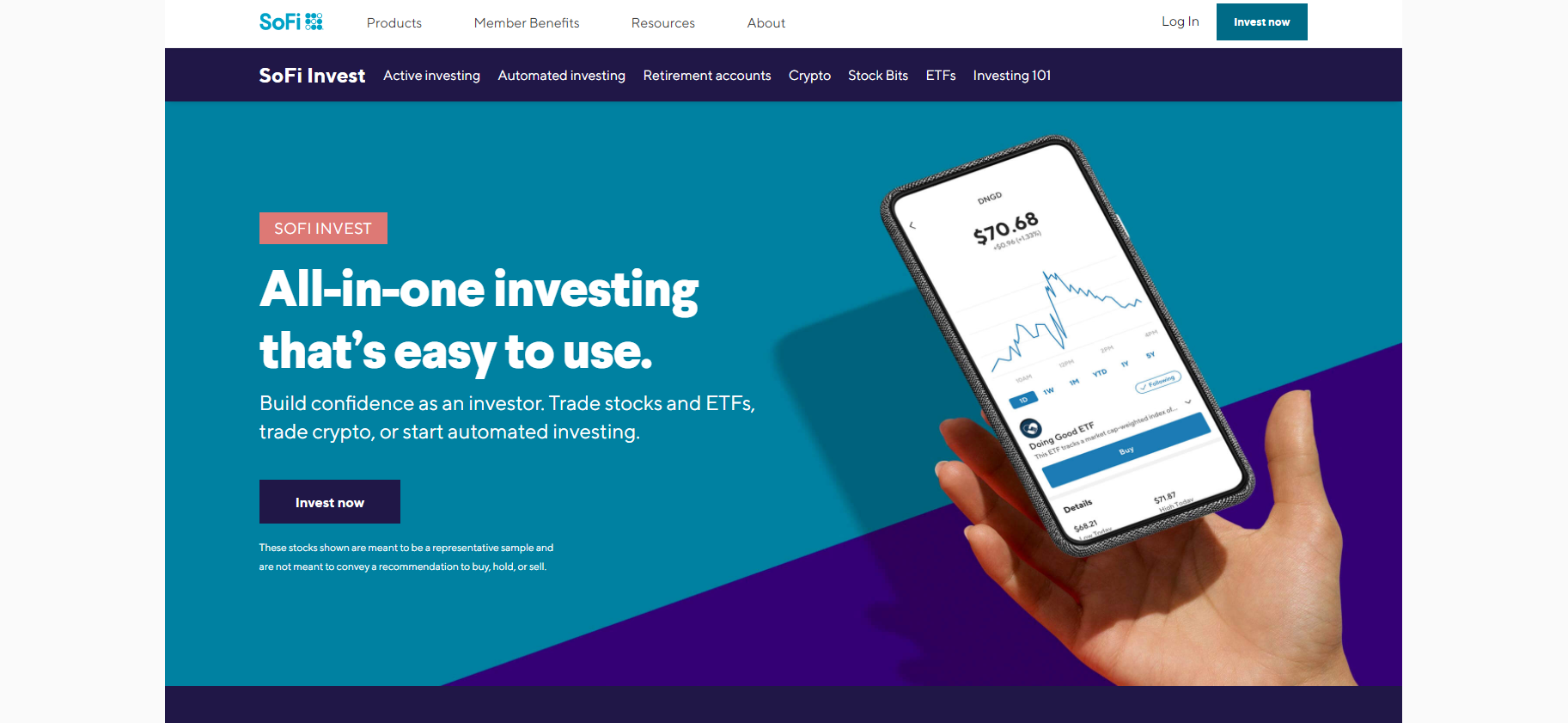
SoFi is an investment platform that’s ideal for beginner investors who are looking for a comfortable and straightforward avenue into the world of investing. The platform, which is also available in the form of an app, has no minimum amount to open an account so even if investors don’t have much to enter the world of stocks and shares with, there’s still plenty of room to get started.
SoFi Invest is a strong option for users who also have SoFi accounts. This is because SoFi makes it easy for users to move money between their investment account and their SoFi Money account.
For advanced investors, the features offered by SoFi may prove to be a little bit limiting, as the platform doesn’t offer stop-loss orders or tax-loss harvesting. However, if you’re simply aiming to get started in the world of investing, SoFi is a highly resourceful platform that offers plenty of strong visualisations that are easily accessible in app form. The platform also offers complimentary access to Certified Financial Planners should any questions or concerns arise.
It’s important to note that SoFi is currently only accessible to users in the United States, so if you’re looking to start your investment journey elsewhere, it’s worth exploring your options further.
13. M1 Finance
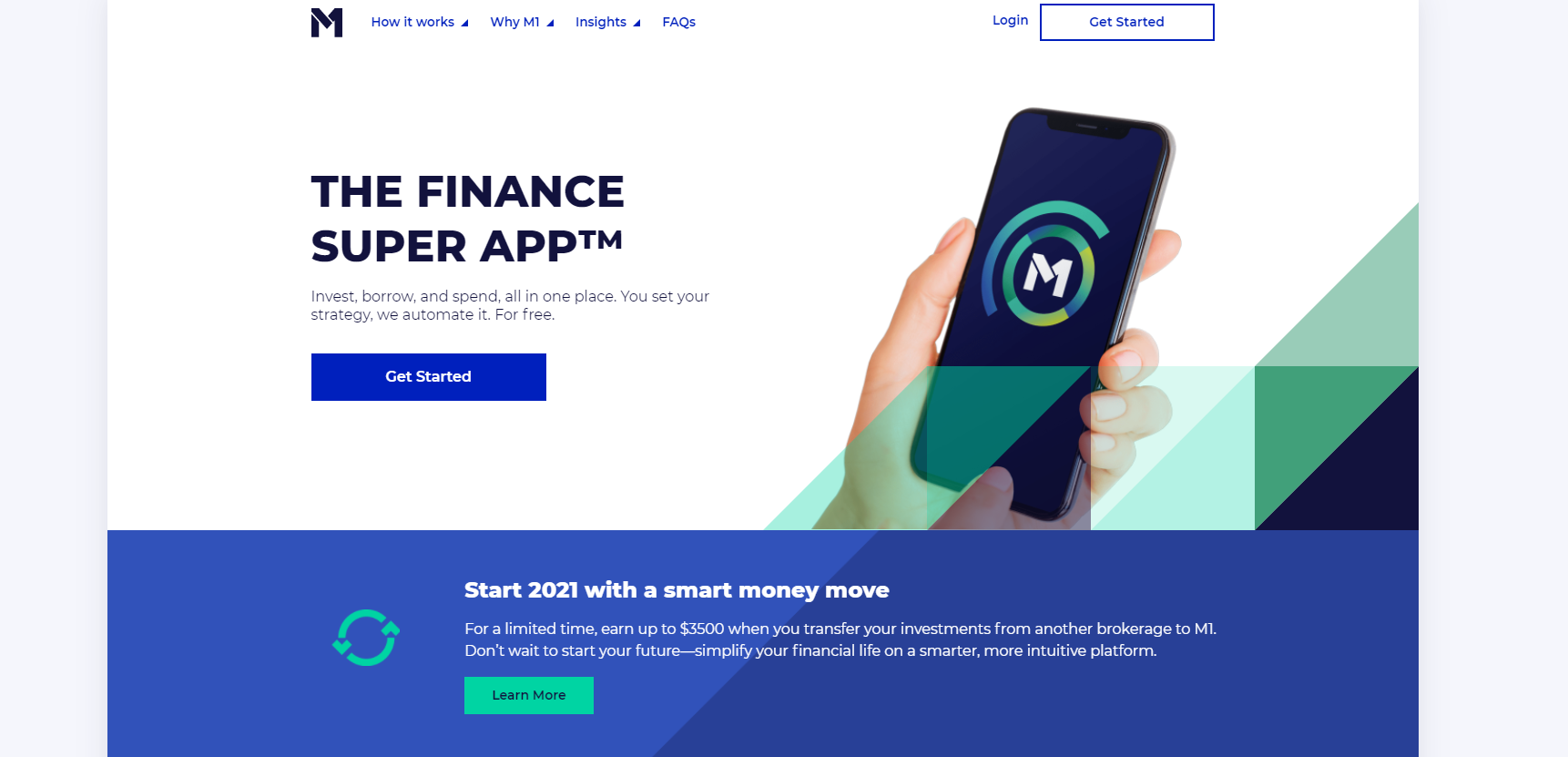
M1 Finance delivers a combination of automated investing tools and a high level of customization that you’re unlikely to see elsewhere across the investing landscape. This allows clients to create a portfolio that’s tailor suited to their precise specifications. However, it’s important to note that this is not an advisory service.
Today, M1 Finance has more than $2 billion in assets under management and half-a-million clients. The customization services offered by M1 Finance makes it a leading tool for more experienced investors to better track their portfolios. The platform also doesn’t charge any portfolio management or trading fees – or any fees for deposits or withdrawals to a connected bank account for that matter.
This platform allows users to create portfolios containing low-cost ETFs or use individual stocks – or even both at the same time. M1 Finance’s platform has been developed for customers with industry experience in mind and positions its services as a lower-cost alternative in which they can utilize fractional share transactions and exhibit a larger level of control over their portfolio contents. The key appeal for M1 Finance is that, unlike with other platforms, users don’t have to give up the control of their portfolios in exchange for quality management services.
Using M1 Finance, it’s possible to choose one of over 80 pre-built, expert portfolios or construct your own. You’re also able to build pie charts to better visualize your asset mixes within your portfolio and keep them balanced to your specifications.
M1 Finance’s offering promises a greater level of flexibility and control over the assets they own within a platform that includes stock and ETF screeners to help with better investment selection.
14. Moomoo
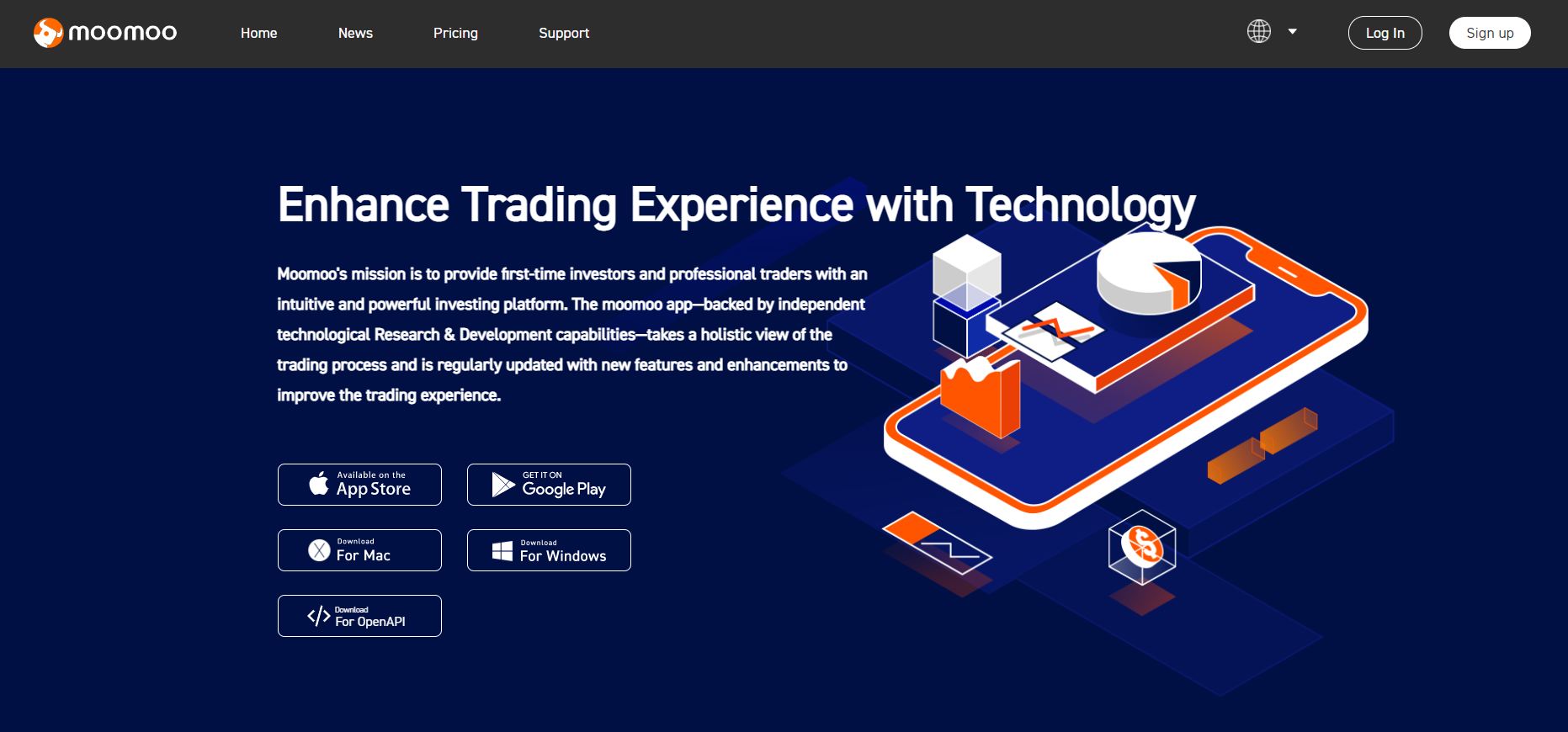
Moomoo has been developed as a next-generation brokerage. The platform is designed to cut out the costs of operating traditional branches and the various excesses of brokerage firm overheads and deliver better value to users in the process.
Combining technology with on-the-go trading, Moomoo aims to offer an enhanced trading experience by combining the latest technology and encompass it in a user-friendly mobile app.
Moomoo certainly looks like a strong competitor when it comes to value and usability. However, newer investors may be a little overwhelmed by the sheer volume of tools available for investment insights.
The app itself appears to be tailored towards users to are looking to take a more hands-on approach to investment management, and it offers real-time data, advanced charting features, intuitive graphs and much more visualizations in order to make it easier than ever to place trades.
Another popular feature that Moomoo uses revolves around paper trading. This allows users to take the platform for a test run without any risk to their capital, learning the ins and outs of the platform as they go.
15. Schwab.com
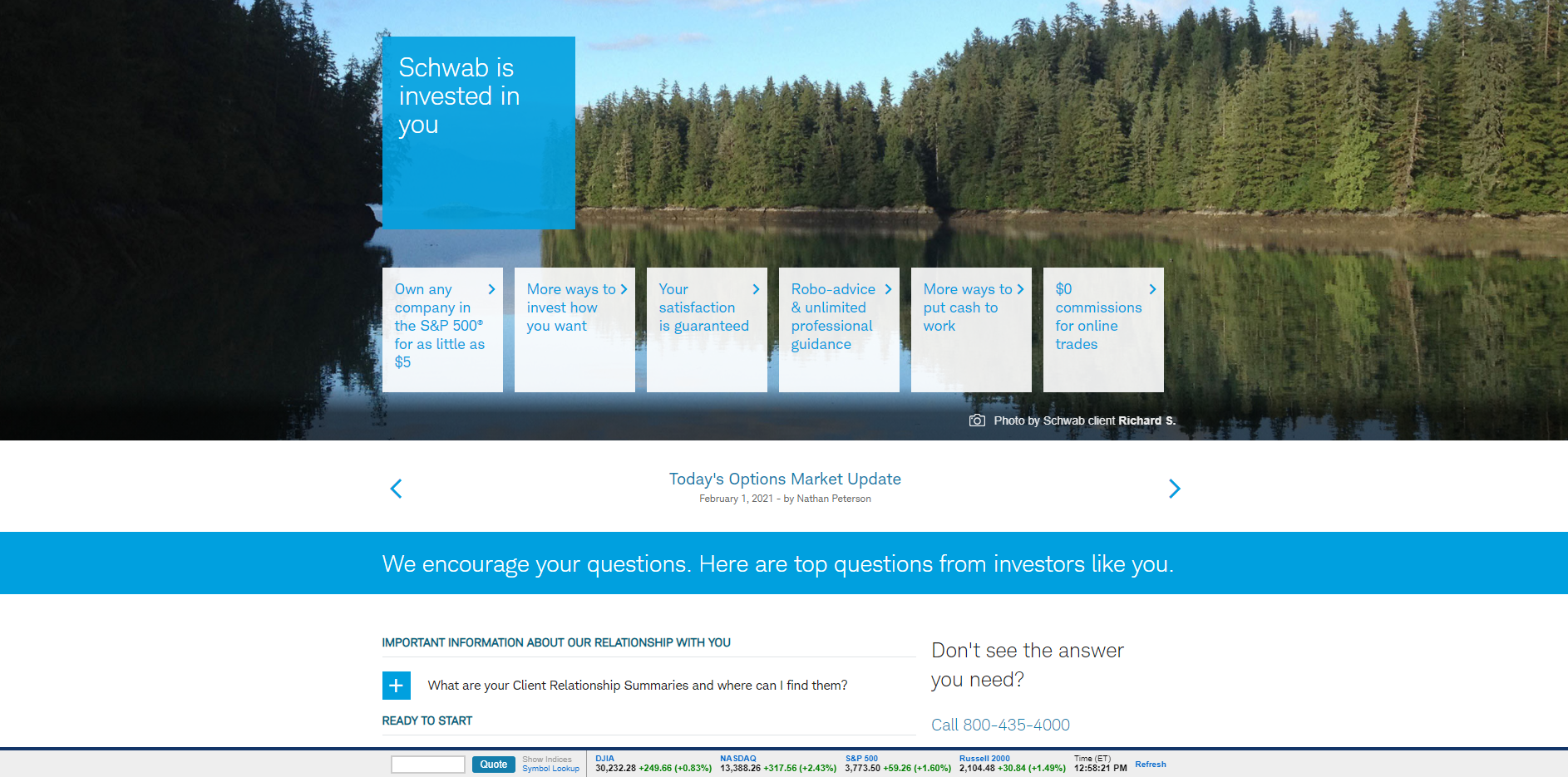
Schwab is one of the biggest names in the online brokerage space and it’s only getting bigger judging by the company’s recent acquisition of TD Ameritrade. Due to its sheer size and reach, Schwab is able to offer investors a huge volume of services and tools including a highly intuitive mobile app.
Over the recent past, Schwab looks like it’s encouraging its customers to work with advisors more frequently – whether they’re human or automated, as opposed to managing their own personal investments. However, self-directed traders and investors can still enter the world of stocks and shares on their own by utilizing the StreetSmart Edge and Trade Source platforms offered by the brokerage. Schwab also welcomes futures traders to its platform too – a quality that isn’t typically matched by other brokerages – although it does make them play on a separate platform.
One of the biggest changes in Schwab is its recent elimination of fees. Despite this significant change to its business model, the loss of fees looks as though it won’t hurt the company’s bottom line – Schwab makes the large majority of its income through uninvested cash that costumers have in their accounts. This means that users can rest easy knowing that the platform will continue to innovate and provide resourceful solutions long into the future.
The most vital thing to remember about stocks and shares is that it’s a free market. Robinhood’s move to restrict the movement of its users may have been a PR disaster, but it highlighted the strength of an industry that’s embracing developing technology and turning it into intuitive services for investors.
If the quality of Robinhood’s alternatives is anything to go by, the future of investing will not only be bright, but better integrated and more accessible. With many platforms combining traditional stocks with cryptocurrencies like Bitcoin and on-the-go accessibility, soon even the most inexperienced of traders can have comprehensive portfolio management functionality at their fingertips.

